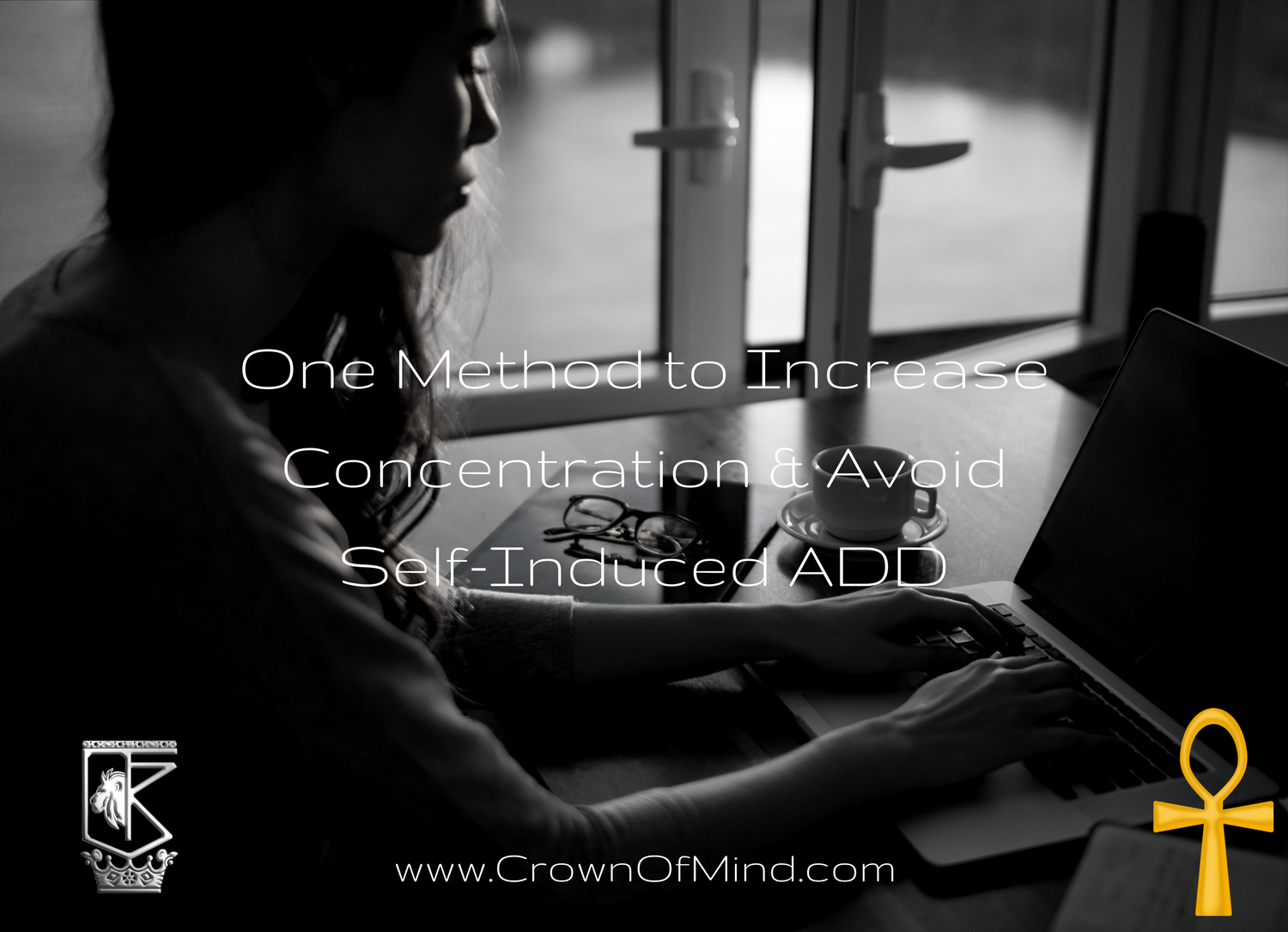The definition of ADD is: “a developmental disorder that is marked especially by persistent symptoms of inattention (such as distractibility, forgetfulness, or disorganization) or by symptoms of hyperactivity and impulsivity (such as fidgeting, speaking out of turn, or restlessness) or by symptoms of all three and that is not caused by any serious underlying physical or mental disorder.” (Webster) There are about 5 more sentences to describe this condition but we need not explore further.
The definition of concentration is “the action or power of focusing one’s attention or mental effort.” (Webster).
If we compare the two definitions, and factor in the statement that it is “not caused by any serious underlying physical or mental disorder,” we can see that ADD at its root can be seen as an epigenetic condition meaning, a condition developed through environmental influences.
What we know from neuroscience (and our own life experience) is if we continue to practice something, we improve in skill. This includes kinesthetic, mental and spiritual skills. And the inner workings of that skill improvement are revealed in how efficient our cells share electrical impulses. Energy. Information.
When we develop a habit, we’re cultivating the efficiency of that cellular information passing from one cell to the next. In our brains it becomes easier to do a thing because we begin making the neural pathways that share the information corresponding to the habit more efficient.
In matters of concentration, we develop this capacity by taking more action in being focused. Removing distractions. Setting an intention. The Kemetic term for this ability to direct is called “Men Ab,” or establishing the will through a process of gaining governance over the bodily systems and emotional conditionings. As the neural pathways developed for concentration strengthen, we are able to better engage with single-pointed direction.
Understanding this, we can conclude that ADD is not a born dis-ease but a cultivated condition. There are many ways we cultivate this self-induced attention deficit:
-Engaging in simultaneous activities, often thought of as “multitasking,” which is false, as we cannot multitask only switch between focuses quickly. This misconception contributes to the development of ADD because professional and personal environments are cultured with the assumption that we actually do multitask. It’s expected. All we do is reinforce the neural cultivation of deficit attention.
-Seeking experiences for their pleasure only. Doing something because it feels good only trains us to move towards things and experiences that induce the pleasure response; this can be deceiving, as all experiences that are pleasure-inducing are not necessarily optimal for our well-being, like heroine. The reverse-training of this is we then do not develop the stamina to work towards long-term goals. If an experience provides enough hardship, we become more likely to quit and focus on something that offers more immediate results (pleasure).
The more we split our attention and resist working through challenges towards a goal, the more we decrease our concentration and cultivate this self-induced ADD.
The Internet is a contributor, and I cover this in my book, SAGE Mind. Citizens in the U.S. tend to have access to it 24/7 on multiple devices. With it we can obtain just about any information ever thought about and shared (shared online that is; some knowledge isn’t on the Net). It started with single-tab browsing.
With the single tab, we have to use the browser for all of our navigation. In order to view a new window, we have to open an entirely new tab.
Then, the multi-tab browser developed.
With this new browser, unlimited tabs could be opened within a single window, enabling us to toggle among them all. This option is available on our pads and phones. Multiple open windows. While it offers versatility and speed, if not worked with consciously we can develop the habit of not finishing what we started in one window while moving on to the other.
Reading 1-2 sentences in one tab then moving to the next tab. Checking out a music video in another tab. Looking at some images in another tab. Some tabs open for no reason. Sending an E-mail from another tab. Downloading an app in another tab. The list continues.
This rapid switching is creating an environment where we can grow this attention deficit, because we have the option to seek and find pleasure stimulation with a click. No longer do we wait until we complete one tab’s content to move on to the next. If it doesn’t appeal, doesn’t feel good then we leave it, and return to it when the pleasure drive for it returns.
Before we realize it, we cannot sit in a single space without stimulation for more than a minute. Concentrating on a task with directed will becomes burdensome. We become anxious and feel the need to move, creating excuses to leave the point of focus. Our social interactions become less engaging because engaging in-depth requires concentration on the content at hand, and the people involved. It requires the attention to truly listen. Developing professional skills also become burdensome because they require time investment to become good at.
Internet Browsing Management for Concentration
For these reasons it will help you to establish some Internet browsing principles. Discipline for your Net use. Here are a few distilled in brief points.
Before performing transformational work, it is important start with the Zazen meditation.
- If the tabs don’t have a relationship, close them. If they have a relationship, keep them open.
- Keep tabs open that you’re immediately working on. Close all others.
- If you’re reading an article, keep your other tabs closed. Finish the article then open up new tabs.
- If you’re watching a video, repeat point 3.
- If checking E-mail, don’t open up new tabs for each E-mail. Read one at a time.
- If you’re reading, turn off the music unless it’s lyric-less.
- Close the tabs on your phone or tablet if you’re not immediately using them.
- If you want to keep a tab, bookmark it for later.
- If an idea comes to mind for you to search in a browser while engaged in a tab already, write it down on paper and save it for later. Search after you’re done with the tab.
With this practice, you’re working towards developing the habit opposing ADD, which is concentration. You will become attention abundant instead of deficit.






